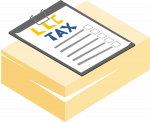Alaska LLC Taxes
Alaska LLCs are taxed as pass-through entities by default, which means the LLC does not pay federal taxes directly. Instead, the revenue from the LLC passes through the business to the members/owners, who then pay personal income tax on the revenue. LLC members’ income is taxed at the 15.3% federal self-employment tax rate (12.4% for social security and 2.9% for Medicare). Alaska is the only state with both no personal income tax and no sales tax, but your LLC may need to pay taxes to your local municipality or borough.
In this article, we’ll cover:


How are Alaska LLCs taxed?
A single-member LLC (SMLLC) is taxed as a sole proprietorship by default, whereas a multi-member LLC is taxed as a partnership by default. Here are the federal tax forms that LLCs with default status need to file:
- Single-member LLC—Form 1040 (usually Schedule C, but some SMLLCs file C-EZ, E, or F)
- Multi-member LLC—Form 1065
However, an Alaska LLC can also choose to be taxed as an S-corp or C-corp. We’ll explain what that means for your taxes.
Alaska LLCs taxed as S-corp
Some LLCs will benefit from electing S-corp tax status, which you can do by filing Form 2553 with the IRS. S-corps are taxed as pass-through entities, just like LLCs with default tax status. This means S-corps don’t have to pay corporate income tax. However, unlike LLCs with default status, LLCs taxed as S-corps can make distributions to their members, which aren’t subject to the 15.3% self-employment tax.
Before you apply for S-corp status, make sure you meet the IRS requirements for S-corps. It’s also a good idea to consult a CPA to see if electing S-corp status is a good idea for your business. Filing your taxes as an S-corp will be more complicated than filing with the default status, and not all LLCs will save money by electing S-corp status.
S-corps report their income to the IRS by filing Form 1120-S.
LLCs taxed as C-corp
LLCs can also elect to be taxed as a C-corp, which is the default tax status for corporations. While this choice is less common than electing S-corp status, some LLCs can benefit from being taxed as C-corps. C-corps are eligible for greater tax deductions than regular LLCs and are more attractive to investors. C-corps must pay the 21% federal corporate income tax and the applicable Alaska corporate income tax. Again, you should consult a CPA before changing your LLC’s tax status.
C-corps file Form 1120 with the IRS.

Alaska State Income Tax
Alaska is one of just a few states with no personal income tax. That means that LLCs with default tax status pay no state income tax to the State of Alaska.
If your LLC is taxed as a C-corp, you will need to pay the Alaska corporate income tax, which ranges from 2% to 9.4%, based on taxable income. Here’s how it breaks down:
|
Taxable Income |
Alaska Corporate Tax Rate |
|
Less than $25,000 |
0% |
|
$25,000 – $48,999 |
2% of the amount over $25,000 |
|
$49,000 – $73,999 |
$480 + 3% of the amount over $49,000 |
|
$74,000 – $98,999 |
$1,230 + 4% of the amount over $74,000 |
|
$99,000 – $123,999 |
$2,230 + 5% of the amount over $99,000 |
|
$124,000 – $147,999 |
$3,480 + 6% of the amount over $124,000 |
|
$148,000 – $172,999 |
$4,920 + 7% of the amount over $148,000 |
|
$173,000 – $197,999 |
$6,670 + 8% of the amount over $173,000 |
|
$198,000 – $221,999 |
$8,670 + 9% of the amount over 198,000 |
|
$222,000 or more |
$10,830 + 9.4% of the amount over $222,000 |

Sales and Use Tax
Alaska has no state sales and use tax. However, some cities and boroughs impose a local sales tax, ranging from 1% to 7%. You can find out the sales tax rate in the municipality where you do business in the most recent Alaska Taxable Report.

Local Alaska Taxes
You’ll need to follow the local tax laws in the city/borough where your LLC is based and anywhere else that you do business. In addition to sales tax, some municipalities charge a local tax on certain goods and services, such as alcohol, tobacco, raw fish, hotels, and gaming.

Other Taxes in Alaska
Here are some other taxes that are imposed by the state of Alaska.
Alaska State Employer Taxes
If you are employer, you will need to pay unemployment insurance and workers’ compensation taxes:
- Unemployment Insurance (UI) Tax—As of 2022, the tax rate for unemployment insurance in Alaska ranges from 1% to 5.4% on the first $45,200 of wages, depending on the industry. If you’re a new employer, your tax rate will range from 1.99% to 2.44%.
- Workers’ Compensation—Alaska employers are required to purchase workers’ comp insurance for their employees or self-insure (if they meet the financial requirements to do so). Workers’ comp rates range from around $0.50 per $100 of payroll for the lowest risk employees to around $18 per $100 of payroll for the highest risk employees.
To learn more about Alaska employer taxes, visit the Alaska Department of Labor (DOL) website.
Industry Taxes
The Alaska Tax Division also imposes taxes on certain industries. Here’s a list of industry-specific taxes in Alaska:
- Alcoholic Beverages Tax
- Cigarette and Tobacco Tax
- Commercial Passenger Vessel Excise Tax
- Large Passenger Vessel Gambling Tax
- Fisheries Business Taxes
- Gaming Tax
- Marijuana Tax
- Mining License Tax
- Motor Fuel Tax
- Oil and Gas Production Tax
- Oil and Gas Property Tax
- Tire Fee
- Vehicle Rental Tax

Do foreign LLCs in Alaska need to pay Alaska taxes?
Yes. If you have an Alaska foreign LLC (an LLC that does business in Alaska but wasn’t formed there) you’re still obligated to pay taxes in every municipality where you do business. Check with the local government office in the city or borough where your business operates to see if you need to register for sales and use tax or other local taxes.





